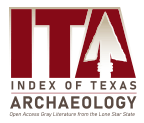Home > Research Projects and Centers > Center for Regional Heritage Research > Index of Texas Archaeology > Vol.
Agency
Texas Historical Commission
DOI
https://doi.org/10.21112/ita.2020.1.42
Abstract
The United States Forest Service (USFS) is proposing to reconstruct perimeter fencing surrounding three Grasslands units located within the Lyndon B. Johnson National Grassland (LBJ National Grassland) in Wise County, Texas. As part of the proposed perimeter fence reconstruction within the three proposed Grasslands units, the USFS is seeking a general inventory of cultural resources which includes background and historic research, archeological field survey, site delineation, a determination of the condition of recorded cultural resources, and recommendation of eligibility for listing on the National Register of Historic Places (NRHP) of any sites encountered.
The overall project tracts are subject to federal jurisdiction and falls under the regulations of Section 106 of the National Historic Preservation Act (NHPA) of 1966, as amended (U.S. Code 16, §470, et seq.). To ensure compliance with Section 106 of the NHPA, the USFS contracted with TRC Environmental Corporation (TRC) to conduct any necessary field investigations required as determined during the coordination process.
The Area of Potential Effects (APE) consists of three Grasslands units where proposed perimeter fence reconstruction will occur. The three Grasslands units include Unit 48, Unit 62, and Unit 63. Together, the three Grasslands units measure 399 acres. A cultural resources survey of these three Grasslands units was performed under Section 106 of the NHPA. For these investigations, Josh Haefner served as the Principal Investigator and Steve Sarich was the Project Archeologist. Field work was conducted by Josh Haefner, Steve Sarich, Benjamin Johnson, Gregg Cestaro, and Haley Wilkerson, the latter two individuals employed by Hicks & Company, the small-business subconsultant for this project.
Results of the background review, completed prior to the field investigation determined that one previously recorded site, 41WS105, is located within the APE; no cemeteries or historic structures were noted within the APE; while one previous cultural resources survey has been performed within or within the vicinity of the APE. This previous survey was a limited seismic survey of Unit 48 and resulted in the discovery of 41WS105.
Prior to survey, TRC coordinated with the USFS on the proposed survey methodology and research design. TRC archeologists performed survey supplemented with shovel testing at the three Grasslands units on October 31– November 08 and December 04 – 06, 2019. During the investigations, a total of 412 shovel tests were excavated. Of these tests, 405 were negative for cultural materials. In addition to these tests 65 points were recorded as “No Dig” locations due to ground disturbance, slope, or other impediment. Seven shovel tests were positive for cultural materials. Three new sites were recorded within the APE and an extension to previously recorded 41WS105 (forest service number: 08130800055) was delineated as a result of the survey. As shovel testing at two of the new sites, 41WS160 (08130800526) and 41WS161 (08130800527), noted no buried cultural deposits and historic cultural materials were observable on the ground surface, these boundaries were established by the mapping of the horizontal distribution of artifacts along the ground surface. Boundaries for the 41WS105 and 41WS159 (08130800525) were based on both the distribution of positive shovel tests and the presence of cultural materials on the ground surface. Based on the results of the cultural resources survey, TRC recommends that no further investigations are necessary and the project may proceed as planned with no historic properties affected.
Creative Commons License

This work is licensed under a Creative Commons Attribution-NonCommercial 4.0 International License
Included in
American Material Culture Commons, Archaeological Anthropology Commons, Environmental Studies Commons, Other American Studies Commons, Other Arts and Humanities Commons, Other History of Art, Architecture, and Archaeology Commons, United States History Commons
Submission Location
Tell us how this article helped you.


